Memorie.al / In mid-December 2012, the “Toena” Publishing House released the second volume of the book with memories of the President of the Republic, Mr. Alfred Moisiu, volume, which includes the period of service in the Albanian Army, after returning from studies at the Academy of Military Engineering in Moscow, from 1958, until January 1985, which is also the time of his retirement. In this period, his activity is shown, from the position of instructor in the Genius Directorate of the Ministry of People’s Defense, to the position of Deputy Minister of Defense, and then the time of serving the sentence, after being demoted, as Genius Brigade chief, in Burrell.
Information is given during the work as a Brigade Commander in Kavajë, about the developments in the Albanian Army, after the exit from the “Warsaw Treaty”, about the so-called “Military Coup” in 1974-’75, about the fortification, about the period of purges in the army, after the suicide of Mehmet Shehu, in December 1981. Further, it is told about the time in retirement, about the democratic developments, about the work as Minister of Defense, in the Technical Government of 1991-1992, the continuation of the further career in that ministry after the victory of the Democratic Party, in 1992, until 1997, including the events of that unforgettable year. It talks about the organization and activity of the Albanian Atlantic Association, until June 2002, when he was elected President of the Republic of Albania.
In this article, the chapter is selected, which talks about the painful events in the Albanian Army, during the years of the communist dictatorship. In the first part of the selected material, we talk about the first accusations and then the punishment of Beqir Balluk, the accusations and the terrible gatherings, and the beginning of the purge that penetrated to the foundations of the Albanian Army. Of great importance is the treatment of the figure of the former prime minister and minister of People’s Defense, Mehmet Shehu, who in this passage shows his first doubts and insecurity, saying to Muhamet Prodani, “Shut up, because you will eat it too you! You don’t understand that I have nothing to do…”!
THE EVENTS OF THE SO-CALLED “MILITARY COUP”
From the end of 1972, the theater play of Mirush Jeros, “Njollat e marmme” was shown in the People’s Theater. For this theatrical piece in the press, there were various positive comments, but also in conversations, it was said that in art, a new liberal wind was blowing, which promised something different. Mehmet Shehu, when he had seen it, because he liked it, had applauded it, while Enver Hoxha was told that when he saw it after a few days, he stood with a frown throughout the performance, then, at the end, he was anathema. In March 1973, at a meeting of the PPS Central Committee apparatus, Enver Hoxha issued an accusation against Fadil Paçrami that he never expected, calling him; “Political lightning”, expression still unheard before, from his mouth.
As if on command, the pursuit of drama writers began, one of whom was Fadil Paçrami. When in the middle of 1973, the 4th Plenum of the Central Committee of PPSh took place, they were declared “enemies” and condemned; Todi Lubonja, Dashnor Mamaqi, Fadil Paçrami, as well as several other staff from the education and culture sector. It seemed clear that, no matter how the problems were served, there was going to be a storm ahead, but we could never have guessed what happened next. This plenum was very tough, but it mainly focused on the sphere of culture and ideology. The decisions of this plenum, with the main cadres of the Army, were worked out in Durrës.
Among other things, the delegate of the Central Committee of PPSh, in the meeting, stated that; “the military have not delved enough into the conclusions of the plenum”, which made us doubt that in the future, even with the Army, something similar could happen. I remember that during the holidays of the activity, I was talking to General Todi Naçon, why a special activity was being developed with the military, for a problem that had nothing to do with our main tasks, I told him: “I believe that this is not being done In vain! Apparently, something must happen to us in the future as well.”
Of course, we didn’t know anything concrete, but we were seeing that a well-known tactic of the Party was being outlined, that from time to time, some hostile group had to be found, which not only drew attention from people’s daily problems, but also made people with functions, so they could think about whose turn it was next. At that time, there were continuously different anecdotes, with strong political significance, which were attributed to Shkodra, but which did not come only from there. That’s how a word began to circulate, or it could be an anecdote, attributed to a high personality of the time that: “Only Comrade Enver has a chair with four legs, the rest of us all have three legs”!
This statement contained a reality, that everyone could make a mistake and only he did not make a mistake, not because this could not happen, but his mistakes were either not pointed out, or were fixed quietly, or passed on to others , who also paid for them, although their role could have been secondary. General Halim Ramohito, writes in his memoirs: “For all the failures and negative consequences that resulted from the implementation of the ‘so-called reforms’, initiated by Enver in 1974, he passed the responsibility to us, as it was in his character, that in situations of turning points and such important decisions, in cases of failures, to throw the blame and responsibilities on others”!
I completely agree with this conclusion drawn by General Ramohito, who, due to the political functions he performed in the Army, knew the dictator very well. There, in the middle of the first semester of 1973, the secretary of the directorate, the late Anastasi Budina, informed me that from the Institute of Military Studies, they had brought a material that only I, as director, should see, and for which I should I gave my opinion in writing. Commitments to numerous tasks forced me to spend two-thirds of the month down in units and departments, checking and following the fortification works. General Ernest Jakova, at that time the deputy director of the Institute of Military Studies, insisted on this several times and told me that; the material had to be seen, since this was the minister’s order.
So, one Sunday in May 1973, early in the morning I went to the office, to study the material, which was later named “Black Material”, which would be the cause of the beginning of an unprecedented crusade in the history of the army , but also for the whole Party. I did not attach so much importance to the study of this material, considering it more as a theoretical writing than as a general line for the construction of the country’s military strategy. The senior military cadres, for the most part, who studied this material, did not even think about the consequences of reading it, and especially the written opinion they would give, which it was required at all costs.
So, the material that had to be read and studied, to give opinions, as far as I remember, could be about 250-300 pages. In the prepared material, as a breakdown of the Theses of the Defense Council, I glanced only at the opening chapter, while I carefully concentrated on the fortification part, which was my professional part, for which I had special responsibility. While reading, I noticed a slightly strange contradiction, since, while it was a matter of solid fortification, at the same time, the main importance was given to maneuverable defense.
This impressed me a lot, because I did not understand why all that fortification and spending had to be done, when the defense would be maneuverable, which easily provided retreat in depth, up to partisan war. Maneuverable defense is known as a form of combat and operation, but it is mainly used by large armies that have large territories. They have the ability to organize such defenses, withdrawing to release territories, until the appropriate ratio of forces is reached, to move on to counterattacks or countermeasures.
Based on this grotesquely described conclusion, I noted that I did not agree with what I read in the material. I suggested that; this way of presenting the problem did not correspond to what we were doing concretely in the army, carrying out huge expenses for the fortification of the country and then these fortified defense belts were released so easily. I drew the conclusions as a professional in that job, not knowing that this would play a very important role in avoiding the hit on me.
I remember, when the discussion about these problems was taking place in the Party, I happened to meet General Halim Ramohito, who expressed his opinion that he was surprised by what I had written about. When I made that assessment, it hadn’t even occurred to me what role it might play. The judgment about the material was made, starting from the professional side, justifying the effort and expenses for fortification, as an insufficient evaluation and use of it, in the development of combat operations. In June 1974, the news broke that Beqir Balluku, at the meeting of the Political Bureau, had been put in serious difficulties, when the problems of the implementation of the Popular Military Art were discussed, and especially the remarks on the interpretation of the “Theses of the Defense Council”.
It was rumored that Beqiri had been expelled from the Political Bureau. We did not believe that he would suffer, being known as one of Enver Hoxha’s greatest loyalists. Beqir Balluku, in secret division, was considered as a member of the main four of the leadership of that time. On the day of the army holiday, July 10, 1974, Beqir Balluku was nowhere to be seen, which proved the rumors that were circulating. The class war continued with its zigzags, sometimes rising and sometimes falling, as Nexhmije Hoxha described it in her theoretical studies. Although such clashes, in the highest spheres of the PPSh, had not happened since 1955, when Tuk Jakova and Bedri Spahiu were hit, nevertheless, from time to time, it happened that various members of the Central Committee were declared enemies, but this time, it was number four in the hierarchy of the top Communist leadership.
The material drawn up by the working group, under the direction of Generals Ernest Jakova and Spiro Shalesi, which was given to us for review, was later called “Black Material”. When they were asked to account for that, they stated that they were called by Beqir Balluku and were told that this task had to be done according to the order given directly by Comrade Enver. He was then further told not to worry too much about the issue of Theses because, after all, they must be verified and proven, both theoretically and practically. With this he wanted to say that; Theses could be revised, aiming to improve them, hinting that there was no need to be afraid, since this task was being carried out directly, by order of the Commander-in-Chief.
When the Theses were announced by Mehmet Shehu, he also said that they should be verified in practice and that appropriate changes could be made to them, if deemed reasonable. Spiro Shalesi, said that Petri Dume, in June 1973, had told him; do not deal with the materials, even though he knew that this work was done by order of the minister. In fact, there was word in the ministry that a select group of theorists is sequestered somewhere in a holiday home and is working to debunk the Theses. This, as I had heard, was being done by order of Minister Balluku and by direct order of Enver Hoxha. Some commented on this as an attempt by Balluk to balance the blow he had received, since the Theses were not prepared by the Ministry’s apparatus under his direction, but by Mehmet Shehu personally.
However, no one could think of the tragic course that this work would take, in the lives of Beqir Balluk and others. Enver Hoxha, addressing Balluk in the Bureau, regarding the fact that everything was done on his orders, stated: “As Hito tells me, you lied to him with Petrit, as if you knew about the materials you were preparing Comrade Enver, you only talked about the structure of the Ministry’s apparatus, and he told you that it is not a matter of structure, but a matter of method and style at work friend Enver, for the material you were processing”!
The accusations against Beqir Balluk, at the meeting of the Political Bureau, took a direction that had nothing to do with scientific research work, such as the processing of the “Black Material”. Enver Hoxha channeled Balluk’s actions as his attempt to divide the Party. Thus, Enveri said: “One of the directions of Balluk’s activity is the aim of discord between Enveri and Mehmet Shehu”. Further, Enver Hoxha developed his masterful fantasy: “Beqir’s activity had two goals: the first goal: to create divisions in the leadership, to achieve its weakening, and the second goal: to succeed in weakening the Army, two from the main directions that the enemy aims to achieve. Both of these goals like it or not, friend Beqir, are hostile.”
In the Army, these events were not yet known in their entirety. They became known in July 1974, where a training meeting was organized with the main cadres of the Army, in Golem of Durrës. Specifically, there was a strong debate about the Free Military Schools, about the prepared military theoretical material and about the problems of fortification works in the Army. As participants, we were isolated in the campsite set up for us with the intention that until the end of the work, no one would leave. There, we talked to each other in conjecture, because no one knew anything for sure. Even on July 10, which was the “Army Day”, we were put on buses to take us to our homes, to change and participate in the solemn meeting dedicated to that date.
Then, after the meeting was over, after re-wearing our training uniforms at our homes, we returned to Golem. On those days, the Army’s active duty took place in Durrës. According to the materials published later, it turned out that at the meeting of the Political Bureau, Enveri had given Mehmet Shehu the order to work on the concerns of the Bureau with the main cadres of the Army, where, in addition to Minister Balluku, several members of the leadership were present. . One day, before we went to Durrës, to Vila e Zogut, where there was going to be a discussion about the conclusions of the APS Political Bureau, Petri Dume told me and Muhamet Prodani to stand by Beqir Balluku. The goal was that during the development of the works, we would be close to the minister, so that nothing would happen to him. “We thought about you both, because formally, he is still in leadership, so it is not possible to place ordinary officers next to him”. However, it did not occur to any of us that things were taking the direction it later proved to be.
The meeting hall in Vila e Zogut in Durrës was filled with the main cadres of the Army. On the podium were: Mehmet Shehu, Hysni Kapo, Ramiz Alia, Rita Marko, Kadri Hazbiu, Hekuran Isai. The first to speak was Mehmet Shehu, who was already charged with the duty of the Minister of Defense, in addition to that of the Prime Minister. He made a summary of Enver Hoxha’s speech at the Political Bureau, held in June of that year. After him, many high officials of the Ministry and the Army took the floor, who strongly criticized Beqir Balluku. I was surprised by what I heard there, that within a short time, the participants in the discussion changed their opinion so quickly about the minister, whom they not only respected, but showed constant servility towards him.
How hypocritical and unfaithful those declarations seemed! Meanwhile, Beqiri, distracted and still not fully aware of what was happening, wrote some words on a piece of paper, such as: “enemy”, “traitor”, and other statements that he heard from the mouths of his former subordinates during discussions. The fact that he was not sitting with the other members of the leadership showed that everything was over for him, despite the fact that he was driving in his Benz car and was accompanied by his personal bodyguard.
Initially, it was understood that this would only be left to Beqir Balluku, Ernest Jakova and Spiro Shalesi. It was said that Petrit Dume together with Hito Çako, were the initiators of the discovery of their activity. So, as such, they came out as heroes of the Party who saved the Army from the great evil that threatened them, so, although they left the positions they held before, the Movement was considered as a reward: both were appointed deputy ministers. In July 1974, Enveri, speaking in the Political Bureau, about Petrit Dumen and Hito Çakon, said: “Both of these comrades have the merit of opposing the wrong and treacherous line of Beqir Balluk and constantly fighting against his views, as well as did many other Army cadres. This shows that they are capable not only of leading from the military side, but also of seeing the ideological and political side of the issue.”
The place, as Chief of the General Staff of the Army, was taken by Sami Meçollari, while Dilaver Poçi was charged with the function of Political Director. After that, this directorate left the building of the Ministry of People’s Defense and was deployed to the offices of the Central Committee of the PPSh. From the analysis made, it turned out that her stay at the headquarters of the MMP had reduced her to the directorship, as an organic part of the MMP, although she has always been the important director of the Central Committee of the ALP. Later developments showed that this was just a tactic to put those, who have not yet been named, to sleep.
It was emphasized that; the directive of the Party was violated, that; “no space should be allowed to the potential aggressor, even a single soldier, to set foot on our soil”! This thesis was widely used, because it was considered that by capturing a part of the Albanian land, the enemies would have the opportunity to announce their own government, which would complicate the affairs of the Albanian state in the international arena. This thesis resulted in the fact that along our land and sea border, ready machine-gun forces were deployed. So, the Army’s forces were evenly distributed throughout the border perimeter, which was unjustifiable from a tactical point of view.
The last days of summer and early autumn were still difficult for the senior military. After the problems rose for Balluk, Mehmet Shehu initially said: “We will not give any other cadre to Beqir Balluk”, but no one believed that everything had calmed down. Mehmet Shehu could have had it in his mind that this crazy witch hunt would be limited to that, but apparently this did not enter into Enver’s calculations. He wanted to go deeper into “purging the Army of hostile elements,” as it claimed.
General Muhamet Prodani, who was very close to Mehmet Shehu, determined since the time of the War, as described by General Ramohito in his memoirs, among other things, had said to the Prime Minister: “What are you doing like this, you are destroying it completely The army…!? What have you done, that you are hitting them so fiercely?! Mehmet had told him: “Shut up, you will eat it too! Don’t you understand that I have nothing to do?! With this it is understood that even the prime minister himself was not very sure about himself, how far the attack could extend. The paranoia of the Commander-in-Chief was unpredictable.
Although the tasks in the Army departments were carried out according to the previously approved programs and plans, it was still felt that something had not gone to the end. The new Chief of the General Staff, Sami Meçollari, as those who knew he closely said, liked to do things to be noticed. One day, while we were in the office of top secret documents of the General Staff, studying a map of war planning, a gesture of his caught my eye, which I cannot forget. I, Petrit Dume and Sami Meçollari were in the office.
When the head of the office, officer Ymer Preçi, unfolded the map in front of us, Petrit Dume moved his hand on the map, to show something, Sami Meçollari, removed his hand from Petrit, in such a way that let us understand, lack of respect for him, however, he did not react. Meçollar’s action left me with a bitter taste because, after all, General Petrit Dume was known both for his contribution to the War and to the Army, where he enjoyed indisputable respect. I said to myself, “Surely he must know something more than the rest of us, since he showed such a lack of respect by treating him in that way, regardless of the position he currently held, his age and experience being so far removed from him. “. Memorie.al




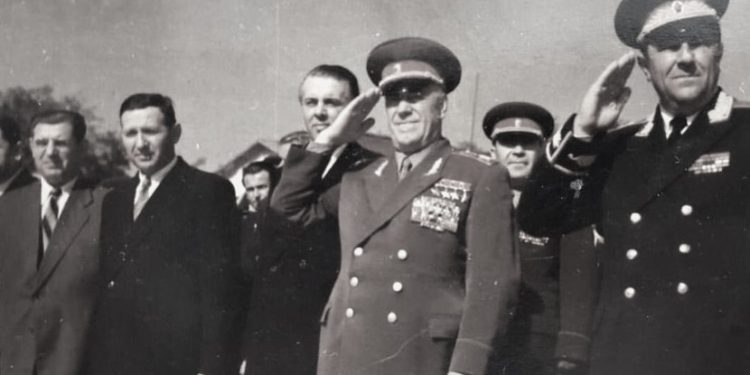
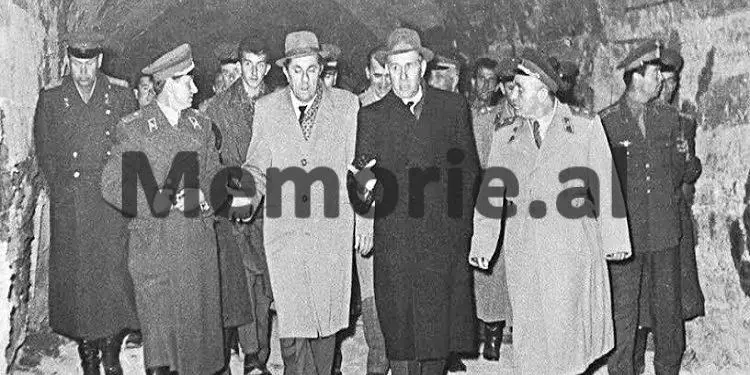
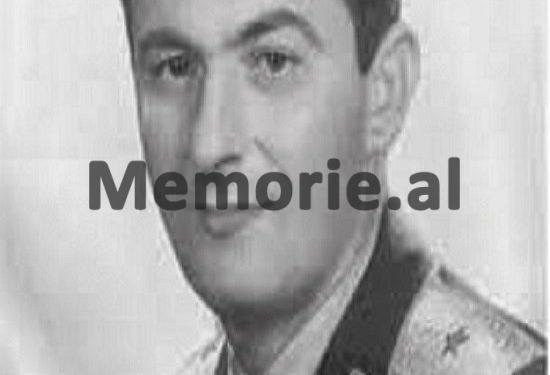
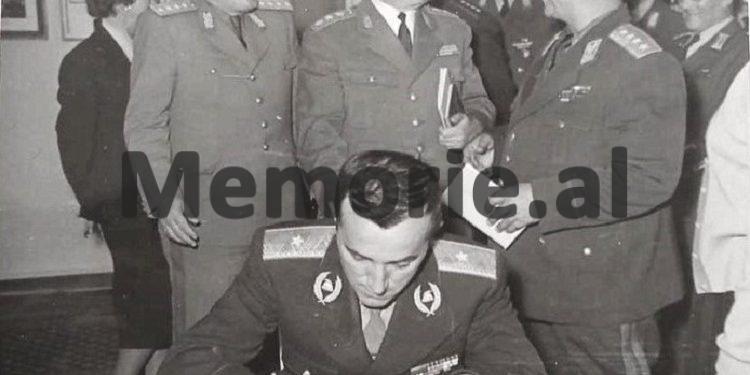
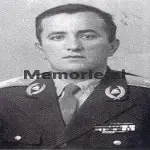
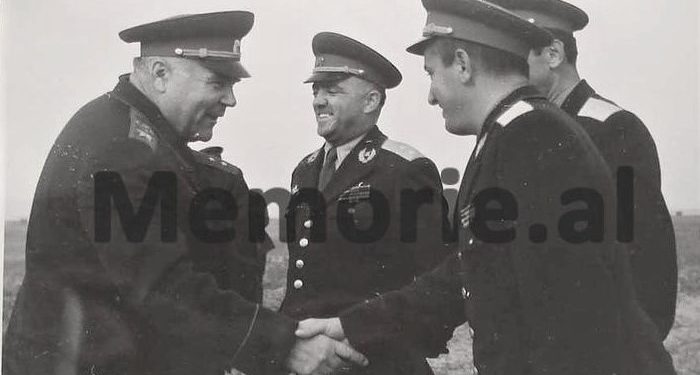
![“When the party secretary told me: ‘Why are you going to the city? Your comrades are harvesting wheat in the [voluntary] action, where the Party and Comrade Enver call them, while you wander about; they are fighting in Vietnam,’ I…”/ Reflections of the writer from Vlora.](https://memorie.al/wp-content/uploads/2025/06/admin-ajax-4-350x250.jpg)


![“The ensemble, led by saxophonist M. Murthi, violinist M. Tare, [with] S. Reka on accordion and piano, [and] saxophonist S. Selmani, were…”/ The unknown history of the “Dajti” orchestra during the communist regime.](https://memorie.al/wp-content/uploads/2026/02/admin-ajax-3-350x250.jpg)
![“In an attempt to rescue one another, 10 workers were poisoned, but besides the brigadier, [another] 6 also died…”/ The secret document of June 11, 1979, is revealed, regarding the deaths of 6 employees at the Metallurgy Plant.](https://memorie.al/wp-content/uploads/2026/02/maxresdefault-350x250.jpg)

